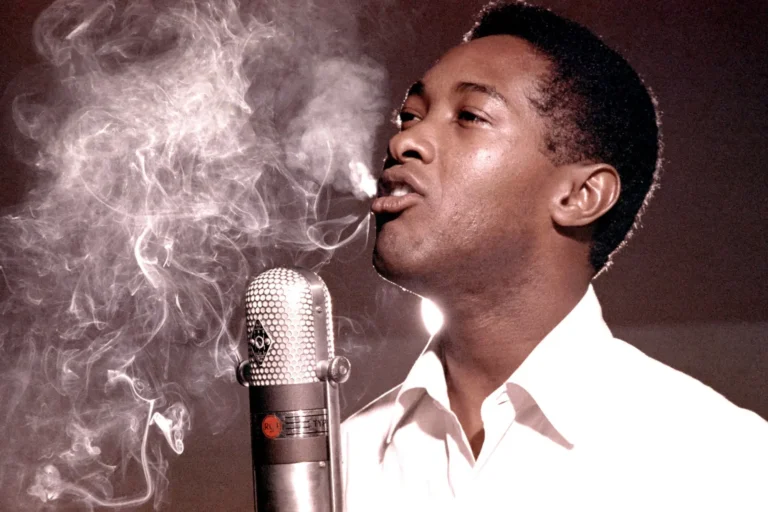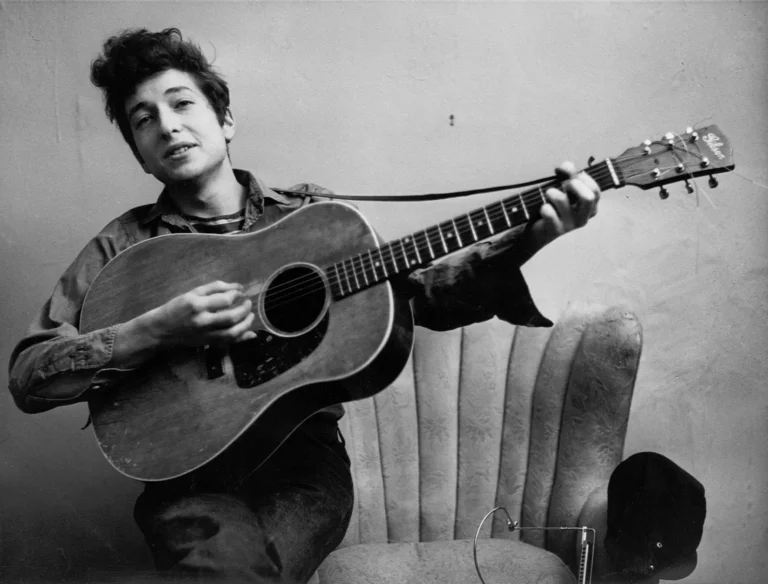20 Favorite David Bowie Tracks
20. Sunday
Album: Heathen | Album Review by Stephen Thomas Erlewine
Heathen marks a new beginning for David Bowie in some ways — it’s his first record since leaving Virgin, his first for Columbia Records, his first for his new label, ISO — yet it’s hardly a new musical direction. Like Hours, this finds Bowie sifting through the sounds of his past, completely at ease with his legacy, crafting a colorful, satisfying album that feels like a classic Bowie album. Read more…
19. Sound And Vision
Album: Low | Song Review by Dave Thompson
When RCA, David Bowie’s record label at the time, announced that the release of Low was tantamount to commercial and artistic suicide, “Sound and Vision” was precisely what they had in mind, a fragment of a song whose instrumental intro was actually longer than the song itself. Oh, how silly they must have felt when, extracted as the first single from the album, “Sound and Vision” became Bowie’s biggest U.K. hit in two years (since the chart-topping reissue of “Space Oddity”) and was even borrowed by the BBC as background music to its program announcements. Read More…
18. I Can’t Give Everything Away
Album: Blackstar | Album Review by Stephen Thomas Erlewine
It’s difficult to separate 2016’s Blackstar from The Next Day, the album David Bowie released with little warning in 2013. Arriving after a ten-year drought, The Next Day pulsated with the shock of the new — as Bowie’s first album of new material in a decade, how could it not? — but ultimately it was grounded in history, something its cover made plain in its remix of Heroes artwork.
Read more…
17. Rebel Rebel
Album: Diamond Dogs | Song Review by Dave Thompson
One of David Bowie’s most playful numbers, the guitar-riffing “Rebel Rebel” was contrarily lifted from one of his darkest albums, 1974’s Diamond Dogs. The song was originally composed for Bowie’s projected Ziggy Stardust musical in late 1973, although it can also be seen as a farewell of sorts to the entire glam movement which Bowie (and Ziggy) created — a fitting warning, indeed, of the career convolutions he was about to embark upon. Read more…
16. Space Oddity
Album: Space Oddity | Song Review by Dave Thompson
David Bowie’s first hit single, from fall 1969, has long been associated with the first ever Apollo moon landing, with which its release coincided. In fact, it is hard to think of a song less appropriate to such a venture, as Major Tom switches off all communications with earth and prepares to spend eternity floating around in his tin can. Nevertheless, the BBC employed the song as the theme music to its coverage of the event, and Bowie swiftly found himself with a Top Five U.K. smash — albeit one which it would take him three years to follow-up. Read more…
15. Stay
Album: Station to Station | Song Review by Ned Raggett
Strange as it may sound, “Stay” found David Bowie combining the dramatic rock of Diamond Dogs with the funk and soul of Young Americans, ending up with a deserved standout on the Station to Station album as a result. As compared to the generally warmer grooves of songs like “Young Americans” itself, “Stay” has a chillier edge to its bass and beats, due in part both to the addition of icy keyboard backing and Bowie’s own partially muffled singing. Read more…
14. The Width of a Circle
Album: The Man who Sold the World | Song Review by Dave Thompson
An unlikely choice for Bowie’s first ever Russian hit single, around 1973, “The Width of a Circle” was the eight-minute epic which opened, and set the tone for, 1970’s The Man Who Sold the World album. Distinguished on vinyl as much by Mick Ronson’s fluid guitar attack as by Bowie’s own intriguing lyric, the song was originally aired in a BBC broadcast in February 1970, appearing there as a relatively straightforward rocker less than half the length of its studio twin. Read more…
13. Slip Away
Album: Heathen | Album Review by Stephen Thomas Erlewin
Heathen marks a new beginning for David Bowie in some ways — it’s his first record since leaving Virgin, his first for Columbia Records, his first for his new label, ISO — yet it’s hardly a new musical direction. Like Hours, this finds Bowie sifting through the sounds of his past, completely at ease with his legacy, crafting a colorful, satisfying album that feels like a classic Bowie album. Read more…
12. Teenage Wildlife
Album: Scary Monsters | Song Review by Ned Raggett
David Bowie likely titled this song in part because its lyrics partially came from a tune in his own teenage years, but as it was finally written and performed, “Teenage Wildlife” was very much a Scary Monsters album cut. With a very modern (for 1980, to be sure!) feeling, fresh and commanding without sounding it was chasing any trends, the song was also one of Bowie’s most overtly romantic, if more about the feelings of youth than anyone in particular. Read more…
11. Lazarus
Album: Blackstar | Album Review by Stephen Thomas Erlewine
It’s difficult to separate 2016’s Blackstar from The Next Day, the album David Bowie released with little warning in 2013. Arriving after a ten-year drought, The Next Day pulsated with the shock of the new — as Bowie’s first album of new material in a decade, how could it not? — but ultimately it was grounded in history, something its cover made plain in its remix of Heroes artwork.
Blackstar occasionally recalls parts of Bowie’s past — two of its key songs, “Sue (Or in a Season of Crime)” and “‘Tis a Pity She Was a Whore,” were even aired in 2014 as a supporting single for the Nothing Has Changed compilation (both are revamped for this album) — but Bowie and producer Tony Visconti are unconcerned with weaving winking postmodern tapestries; now that they’ve shaken free their creative cobwebs, they’re ready to explore. Read more…
10. The Secret Life of Arabia
Album: Heroes | Song Review from Wikipedia
“The Secret Life of Arabia” is a song written by David Bowie, Brian Eno and Carlos Alomar in 1977 for the album “Heroes”. It was the final track on the original vinyl album, following the instrumental “Neuköln”. NME editors Roy Carr and Charles Shaar Murray described the song as “like seeing ‘The Sheik’ on acid and laughing quietly to yourself. Bowie’s vocal is genuinely humorous.” Author Nicholas Pegg considered it an “unjustly overlooked” piece, remarking on Bowie’s “outrageous extremes of bass and falsetto”. Read more…
09. Seven
Album: ‘Hours…’ | Album Review by Stephen Thomas Erlewine
Since David Bowie spent the ’90s jumping from style to style, it comes as a shock that Hours, his final album of the decade, is a relatively straightforward affair. Not only that, but it feels unlike anything else in his catalog. Bowie’s music has always been a product of artifice, intelligence, and synthesis. Hours… is a relaxed, natural departure from this method. Arriving after two labored albums, the shift in tone is quite refreshing. Read more…
08. Ashes to Ashes
Album: Scary Monsters | Song Review by Dave Thompson
David Bowie’s second U.K. chart-topper was, not at all coincidentally, a very deliberate follow-up to his first, the 1975 reissue of “Space Oddity.” Most easily summed up as the continuing adventures of Major Tom, the spaceman hero of that first song, “Ashes to Ashes” was also a very deliberate acknowledgement of the then-burgeoning new romantic scene — the accompanying video (itself one of the most significant and influential of the age) drew its cast from among the scene’s best-known faces. Read more…
07. Where Are We Now?
Album: The Next Day | Song Review from Wikipedia
“Where Are We Now?” is the first single from David Bowie’s 24th studio album, The Next Day. The single was released on iTunes on 8 January 2013, Bowie’s 66th birthday, along with a video by Tony Oursler, which was posted on Bowie’s website. According to producer Tony Visconti, the timing of the release was Bowie’s idea, and the single was simply “dropped” in iTunes for fans to discover, with no warning or fanfare. Read. more…
06. Sweet Thing
Album: Diamond Dogs | Song Review by Ned Raggett
Split into two parts on the Diamond Dogs album, framing the wonderful “Candidate,” “Sweet Thing” is a beautiful, moody number that more than anything else from that record shows how David Bowie had a perfect knack at infusing older crooning approaches into rock and roll. It was all the more evident with the dramatic opening, as heavily produced piano leads into an ominous but still romantic full arrangement. Read more…
05. Look Back In Anger
Album: Lodger | Song Review by Ned Raggett
David Bowie in the late seventies was the source of any number of sharp-edged, thrillingly modern rock songs that pointed the way forward for more bands than could be counted — among their number was a highlight of Lodger, “Look Back in Anger.” Capturing, in evocative terms, an encounter between the narrator and “an angel,” though one of a seemingly secular bent, the song is another chance for Bowie to demonstrate the magnificently rich croon he had developed by that point. Read more…
04. Heroes
Album: Heroes | Song Review by Ned Raggett
Not even ending up as a Microsoft commercial theme could quench the sheer power and beauty of “Heroes,” arguably David Bowie’s finest individual song throughout his varied, fascinating career. The story of its inspiration got a bit muddled over time — it might have been two employees at the recording studio near the Berlin Wall who Bowie saw in an embrace, or simply two random strangers in the shadow of that Cold War symbol. But inspired by that and with the collaborative help of Brian Eno and, with a jaw-dropping set of solos, guitarist Robert Fripp, Bowie, his backing band and producer Tony Visconti created a true classic. Read more…
03. Young Americans
Album: Young Americans | Song Review by Dave Thompson
The title track to David Bowie’s eighth studio album, in 1975, was the first song recorded for what was, even by the standards of his later maneuvering, a major stylistic change. Out went the glam and hard rock trappings of his most recent releases; in came the “plastic soul” sound which — after three years of trying — would finally break the singer in America: the chart-topping “Fame” was culled from the same LP, while a neatly edited version of “Young Americans,” cut from five minutes to three, at least made the Top 30. Read more…
02. Rock ‘N’ Roll Suicide
Album: The Rise and Fall of Ziggy Stardust and the Spiders from Mars | Song Review by Dave Thompson
Although it is easy to dismiss the song as a more or less straightforward recanting of Jacques Brel’s “Jef,” the closing song on Bowie’s 1972 Rise and Fall of Ziggy Stardust and the Spiders From Mars album possesses a power which raises it far above such honorable origins, into the very pantheon of great pop anthems. Part of its impact, of course, comes from Bowie’s own decision to close his 1972-1973 concerts with the song, crying “give me your hands” to an audience which could not ask for anything more. Read more…
01. Word On a Wing
Album: Station to Station | Song Review by Donald A. Guarisco
This song from Station to Station, a sort of rock & roll hymn, is one of the most underrated entries in the David Bowie catalog. The lyrics are personal and direct in a way that Bowie’s lyrics rarely are as they address his relationship with the idea of religion: “Just because I believe don’t mean I don’t think as well/Don’t have to question everything in heaven or hell.” The lyrics build to an emotional peak on the chorus, which finds Bowie directly addressing his maker: “Lord, I kneel and offer you my word on a wing/And I’m trying hard to fit among your scheme of things.” Appropriately, the melody has a gospel-inspired feel as it contrasts soulful yet quietly rousing verse melodies with an operatic chorus that reaches for euphoric heights. Read more…







